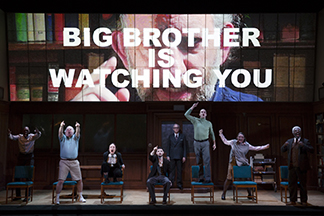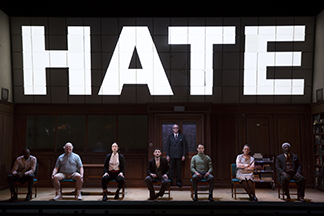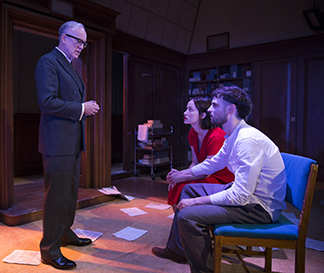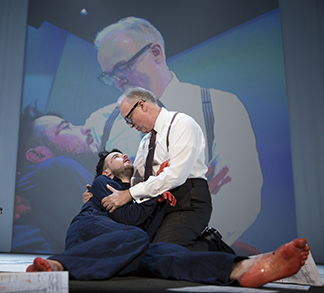By Lucy Komisar
When British writer George Orwell‘s “Nineteen Eighty-Four” was published in 1949 it was viewed as a dystopian novel. Now, it seems taken from the news.
Orwell‘s work, adapted and directed by Robert Icke and Duncan MacMillan, is stunning theater as well as trenchant political commentary. I‘d say surreal, but it‘s too close to the truth. Except it is surreal in the sense that it mixes realistic staging with what we used to call horror video.

The story is set in a province of a superstate that is always at war. The superstate is run by and for the elite, which cares not for the welfare of citizens but for its own power.
The government engages in manipulation and surveillance of the public. The police and the military serve it. The system is directed by Big Brother, the party leader, who is venerated but not seen. But sees all: Big Brother is watching you.
This state uses an invented language to turn lies into truth. Independent thinkers are guilty of thought crimes and are subject to enforcement by the thought police. That spells trouble for Winston Smith, who works for the Ministry of Truth to rewrite or delete past newspaper articles so they support the party line.
Orwell‘s post-war book was taken to describe Stalin‘s Russia. Orwell was a democratic socialist and fierce anti-communist, as his “Animal Farm” shows. It is chilling to realize that his superstate mirrors the United States in key details. Always at war, check. Run by and for the elite, check. Manipulation and surveillance of the public, check. Language that argues war is peace, check. Enforcement against thought criminals?
Ask the whistleblowers of government crimes who have been jailed. Ask Julian Assange. Consider the police and military who enforce the elite‘s policies against all opposition, check. Oh, and there‘s that high-tech torture scene. Ask the victims of Abu Graib. As they left their seats, audience members voiced the connections.
The play starts with a meeting about Winston Smith‘s diary recounting that horrific “past” of a time when, “We should never have trusted them.” The book says there is objective truth, and freedom is the freedom to know that. [I could get into the current infantile fantasy that there is no truth, only your identity. But let‘s not go there.]
Winston (a strong, brave, frightened Tom Sturridge) is taken to an antique shop, where in a snow globe he can see the past. A child is screaming to her father, “You are a traitor, a thought criminal.” And “Big Brother is watching.”

Winston must operate with Newspeak, the only language that gets shorter every year. When there are no words to express something, there is no thought. There is plenty of time for “two minutes of hate.”
That‘s pretty au courant. Who do we hate? Muslims, check. Russians who approve of their government about twice as much as Americans approve of theirs, check. Foreigners with brown skins, check. Anyone who does sex differently than the majority do, check.
And there are the evergreen slogans, “War is peace” (U.S. supported genocide in Yemen at the moment) and “Ignorance is strength” (climate change, except in Texas.)
Winston turns out to be a quiet anti-party revolutionary. By the word. Before shelves of books, he cries, “Down with the party, down with Big Brother.”
He meets Julia (a cinematic Olivia Wilde) who shares his antipathy to the system. They become lovers. She gives him chocolate, “Stuff they keep for themselves.”
She says they can‘t meet again. They would be captured, tortured. But in their lovers‘ bedroom there is a telescreen. Of course, they are recorded. [This is why you put masking tape over the camera on your laptop. This is why you don‘t get “useful” wifi devices that record ambient conversations.]
Back to the kid who turned in her father. Parsons (Wayne Duvall): “My kid made sure he was some kind of enemy agent. Might have been parachuted in or something. But this is the part that‘s really fantastic. What put her onto him in the first place? He was wearing a funny pair of shoes! So chances are he was a foreigner. Pretty smart, right? Pretty smart for a seven year old….I‘m glad they watch us. I am. There are people out there who hate us. Hate our way of life. And if we‘re being watched, so are they.”

But then there is a chance at fighting back. Winston meets someone from The Outer Party, the opposition. O‘Brien (a cool, sterile Reed Birney) who appears to be a high-level functionary but is presenting himself as the opposition, tells him, “You need read Goldstein‘s book.”
This is a book by the opposition leader which is read in secret. He tells him, “An idea is the only thing that has every changed the world.” But would even a good guy use terrible tactics for the right cause?
O‘Brien: If, for example, it would somehow serve our interests to throw sulphuric acid in a child‘s face – are you prepared to do that?
Winston: Yes.
O‘Brien: You are prepared to commit suicide, if and when we order you to do so?
Winston: Yes.
O‘Brien: You are prepared to lose your identity – forego who you are – or to live in hiding?
Winston: Yes.
O‘Brien: You are prepared to terminate your contact with each other [with Julia] – to never see each other again?
NO.
There is no safety from the thought police. Parsons is shouting in his sleep, “Down with Big Brother.” His 7-year-old (Sami Bray/Willow McCarthy) listening through the key hole turns him in.
Finally, Winston, entrapped by O‘Brien, arrives in Room 101, a box of flashing lights in the Ministry of Love. O‘Brien tells him, “You suffer from defective memory.” The torturers wear white suits of the sort used to protect against chemicals. There is darkness, then a drill sound, and he spits blood. He will be electrocuted because he tells truth.
Fast forward to Abu Graib. (Note that CIA officer John Kiriakou, who blew the whistle on the agency‘s rendition and torture program, oh, excuse me, love program, was jailed for two years.)

What will defeat the party? What will defeat the Brotherhood? Humanity? Except that history in the future is a boot in the face. O‘Brien: Imagine a boot stamping on a human face – for ever. The face of the enemy. Defeated. Powerless. But about to be cured.
If you want a picture of the future, Winston, it looks like this. It will always look like this. It has always looked exactly like this.
Winston is reminded that he was willing to commit murder.
The system that organizes world is chocolate. It‘s all that you are, all you care about. O‘Brien reminds, “The individual is dead. The party will always win.” But back to the opening segment, which is the fiction that before 2050 the party fell. No evidence yet that the American war and torture party will be defeated by 2050. Plenty of evidence that the crimes depicted in the play will continue.
“1984.” Written by George Orwell, adapted and directed by Robert Icke and Duncan MacMillan. Hudson Theatre, 145 West 44th St, New York City. (855) 801-5876 or 212-239-6200. Opened June 22, 2017, closes Oct 8, 2017. 9/2/17.

